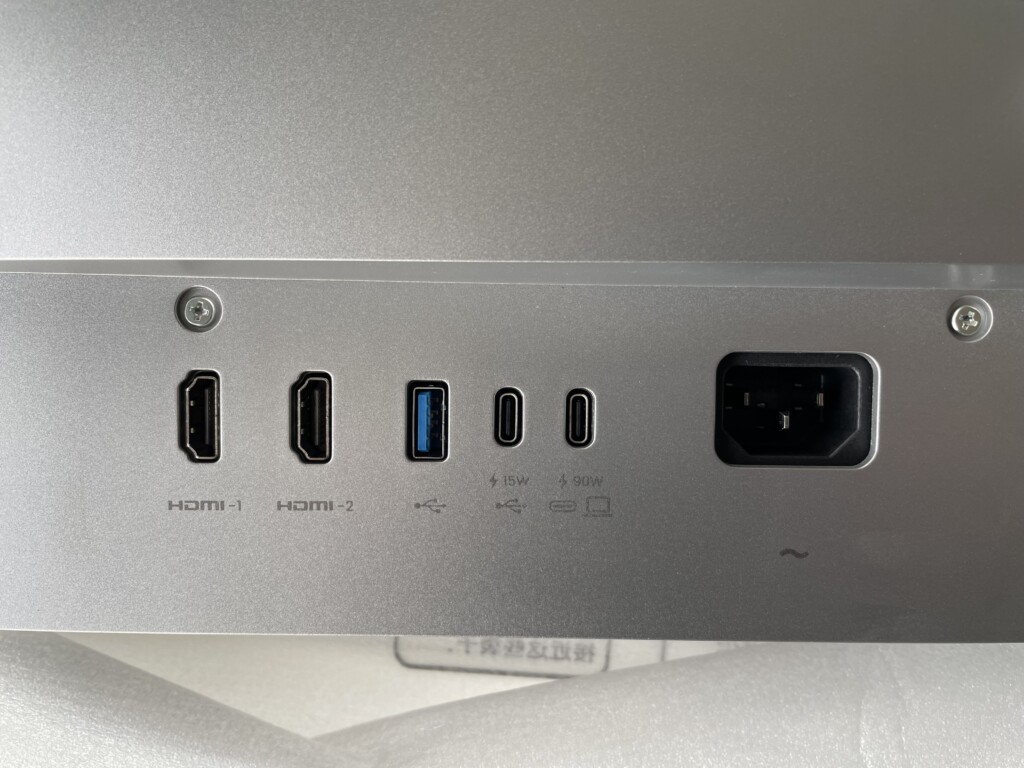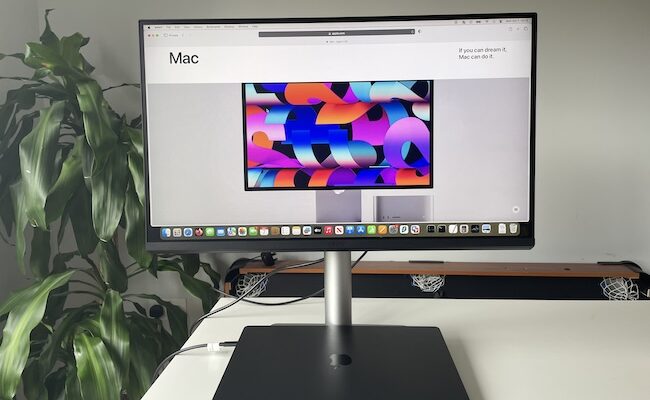If you’re thinking of getting the BenQ MA270U as a much cheaper alternative to the Apple Studio Display, here we’ve taken a closer look at how they compare head-to-head to help you decide.
Both the BenQ MA270U and Apple Studio Display are high-quality 27-inch monitors, but they target different audiences and budgets.
The BenQ MA270U is a more affordable 4K monitor and has been optimized for macOS, while the Apple Studio Display is the best 5K monitor for Macs we’ve seen, thanks to its stunning Retina display, aimed at professionals that need exceptional image quality.
Table of Contents
Comparison Table
Firstly, here’s a comparison table of the two displays to see how their specifications compare side-by-side.
We’ve compared the 27 inch BenQ MA270U with the base level standard glass Apple Studio Display although of course, a more expensive Matt-coated Anti Glare version is available too.
There is also a 32 inch BenQ MA320U but we’ve used the 27 inch version for this comparison as it’s exactly the same size as Apple’s display.
You can use the search tool if you want to compare a specific feature.
| BenQ MA270U | Apple Studio Display (Standard Glass, Tilt Adjustable Stand | |
|---|---|---|
| DISPLAY | ||
| Size | 27″ | 27″ |
| Panel Type | IPS-Type LCD | LCD |
| Aspect Ratio | 16:9 | 16:9 |
| Native Resolution | 3840 x 2880 | 5120 x 2880 |
| Maximum Brightness | 400 nits / cd/m2 (HDR Mode) | 600 nits / cd/m2 |
| HDR Support | Yes, HDR10 | No |
| Contrast Ratio | 1200:1 | – |
| Response Time | 5 ms (GtG) | – |
| Refresh Rate | 60 Hz | 60 Hz |
| Variable Refresh Technology | No | No |
| Color Support | 1.07 Billion Colors (10-Bit) | 1.07 Billion Colors (10-Bit) |
| Color Gamut | 99% sRGB 95% DCI-P3 | – |
| Viewing Angle (H x V) | 178 x 178° | – |
| Pixels Per Inch (ppi) | 163 ppi | 218 ppi |
| Finish | Anti-Glare / Matte | Glossy with Antireflective Coating |
| Touchscreen | No | No |
| CONNECTIVITY | ||
| Inputs | 2x HDMI 2.0 | No |
| Outputs | 1x 1/8″ / 3.5 mm (Headphone) | No |
| HDCP Supports | Yes, Version 2.2 | No |
| USB I/O | 1x USB-C 3.0 / 3.1/3.2 Gen 1 2x USB-A 3.0 / 3.1/3.2 Gen 1 1 (DisplayPort Alt Mode) | 3x USB-C 3.1/3.2 Gen 2 1x USB-C (Thunderbolt 3) |
| USB Power Delivery | 90 W (via USB-C) 15 W (via USB-C) | 96 W (via USB-C) |
| Multi-Input Support (Picture in Picture, Multi input support) | No | No |
| SPEAKER | ||
| Built-in speakers | Yes, 2x 3W | Yes, 6 |
| HARDWARE | ||
| Processor | – | Apple A13Bionic |
| Built-in Microphone | – | Yes |
| Webcam | – | User-Facing: 12 MP |
| ELECTRICAL | ||
| Power Consumption | Maximum: 220.0 W | – |
| Input Power | 100 to 240 VAC, 50 / 60 Hz | 100 to 240 VAC, 50 / 60 Hz |
| Power Adapter | Internal | – |
| GENERAL | ||
| Operating conditions | – | 50 to 95°F / 10 to 35°C at 5 to 90% Humidity |
| Certifications | ENERGY STAR, TUV | – |
| Stand Adjustments | Tilt: -5 to 23° Swivel: -15 to 15° Rotation: 90° to -90° Height: 4.5″ / 115 mm | Tilt: 25° (-5 to 20°) |
| Mounting-Hole Pattern | 100 x 100 mm | 100 x 100 mm |
| Lock Slot | No | No |
| Dimensions | 24.2 x 22.1 x 8.7″ / 613.8 x 560.1 x 220.2 mm (with Stand) | 24.5 x 18.8 x 6.6″ / 62.3 x 47.8 x 16.8 cm (with Stand) |
| Weight | 18.08 lb / 8.20 kg (with Stand) 11.33 lb / 5.14 kg (without Stand) | 13.9 lb / 6.3 kg |
| PRICE | Buy Now: $499.99 | Buy Now: $1,599 |
Display & Resolution
- Resolution: The Apple Studio Display offers 5K (5120 x 2880) resolution with 218 PPI, providing much better sharpness and pixel perfect scaling with macOS and MacBook Retina displays. The BenQ MA270U has a 4K UHD resolution (3840 x 2160) with 163 PPI, is suitable for most needs but less detailed. As a result, you will experience some resolution and scaling issues with the MA270U when using it with a Mac (see more on this below).
- Color: Both monitors cover 99% of the sRGB spectrum, but the Studio Display excels with support for P3 wide color and True Tone technology, ensuring excellent color accuracy. The MA270U does however support HDR 400, providing enhanced brightness for HDR content, which is useful for video editing and fast moving footage.
- Brightness: The Studio Display delivers 600 nits of brightness, compared to the MA270U’s 400 nits. Both are suitable for brightly lit working spaces although those who frequently have to work in direct sunlight may struggle with the MA270U.
Scaling macOS & Retina Displays
The BenQ MA270U and Apple Studio Display differ significantly in how they handle macOS scaling, largely due to their resolutions and pixel densities.
One of the biggest problems Mac users have when using external displays are resolution and scaling issues.
The Apple Studio Display, with its native 5K resolution (5120×2880) and 218 PPI, is optimized for macOS scaling.
It offers Retina-level sharpness, making text and UI elements extremely crisp.
This scaling matches macOS’s default HiDPI mode, providing native and precise rendering without compromises.
This is particularly beneficial for professionals who require pixel-perfect accuracy, such as when using graphic design software and video editing packages.
The BenQ MA270U, on the other hand, features 4K resolution (3840×2160) at 163 PPI.
While it delivers excellent color reproduction and vibrant visuals, macOS’s scaling on it isn’t as precise.
At native 4K, UI elements appear smaller, and scaling to 1080p results in some interpolation, leading to a less sharper appearance.
Although BenQ employs Mac-specific color-tuning technology to match visuals with macOS (its so called “M-book mode”), the lower pixel density and scaling challenges make it less ideal for those that expect Retina quality visuals.
There are third-party tools you can use to improve this such as BetterDisplay but the results can’t be compared with the Apple Studio Display.
In summary, the Studio Display easily outperforms the MA270U when scaling macOS due to its 5K resolution and Retina-like pixel density.
However, for users on a budget or those who prioritize value over ultra-high resolution, the MA270U is absolutely fine for general use, with some trade-offs in scaling and sharpness.
Connectivity
- Apple Studio Display: Equipped with a Thunderbolt 3 port and three USB-C ports, providing high-speed connectivity and 96W charging for laptops.
- BenQ MA270U: Includes one USB-C (90W and 15W), two USB-A ports (one of which is on the bottom of the display), two HDMI 2.0 ports, and a 3.5 mm audio jack, offering more versatility but slower speeds compared to the Studio Display.

Design and Build
- Apple Studio Display: Features a sleek aluminum design, nano-texture glass for reduced glare (optional), and integrated macOS controls for seamless operation. It’s heavier, weighing up to 8.2 kg with the stand, and has limited ergonomic adjustments unless you purchase the optional height-adjustable stand.
- BenQ MA270U: Comes with a nano matte panel for glare reduction and a flexible stand that supports height, tilt, swivel, and pivot adjustments. It’s lighter, weighing 6.3 kg with the stand, and is ideal for ergonomic setups.
Audio and Camera
- Apple Studio Display: Features a six-speaker system with Spatial Audio support, studio-quality microphones, and a 12 MP camera with Center Stage, making it an incredible monitor for video conferencing and multimedia tasks. Most monitors feature sub-par speakers and webcams (if any) and nothing compares with the Studio Display in this respect.
- BenQ MA270U: Includes basic 3W stereo speakers, which are functional but lack any real richness. It does not have a built-in camera.
Pricing
- Apple Studio Display: There’s no escaping the fact that the Studio Diplay is eye-wateringly expensive starting at $1,599, and additional features like nano-texture glass or a height-adjustable stand increase the cost further. However, you can usually pick-up refurbished models cheaper than this (if you can find one).
- BenQ MA270U: Priced at $499.99 for the 27 inch version, the MA270U offers excellent value for its features, especially for macOS users on a budget.
Pros & Cons Summary
| Pros | – Affordable price ($499.99). – Excellent color accuracy (99% sRGB, 95% DCI-P3). – Ergonomic stand included. – Versatile connectivity with USB-C, HDMI, and USB-A ports. – Good macOS integration with Display Pilot software and color tuning. | – Exceptional 5K Retina resolution (5120×2880). – P3 Wide Color and True Tone for industry-leading color accuracy. – Premium build with aluminum chassis. – Integrated 12 MP camera with Center Stage. – Superior speakers with Spatial Audio. – Seamless macOS optimization. |
| Cons | – Scaling challenges on macOS due to 4K resolution. – Basic speakers (3W stereo). – No built-in camera. – Lower brightness (400 nits). | – Expensive ($1,599 starting price). – Limited ergonomic adjustability without purchasing optional stand. – Fewer port options compared to MA270U. |
Conclusion
The Apple Studio Display is best for professionals in creative fields who require superior resolution, color accuracy, and integrated macOS features.
The BenQ MA270U is ideal for general productivity, students, and those on a budget that need a macOS-friendly 4K display.
For users seeking affordability and solid macOS integration, the BenQ MA270U is a great option.
However, if premium features and unmatched display quality are priorities, the Apple Studio Display is a much better, but more expensive choice.
Check out our full review of the BenQ MA270U for a complete look.
You can also find more Apple Studio Display alternatives here.


